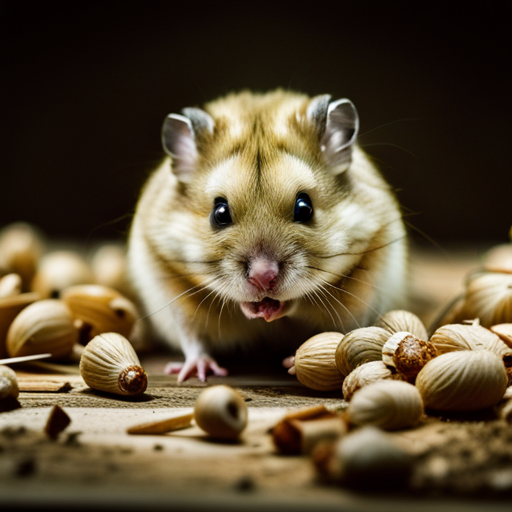
Have you ever wondered why hamsters, those adorable and cuddly pets, sometimes eat their own babies? It’s a perplexing and disturbing behavior, but understanding the reasons behind it can help ensure the safety and well-being of your furry little friends.
There are several factors that contribute to this behavior, including biological factors, maternal instincts, lack of nutritional resources, stress, anxiety, and environmental factors.
By knowing these reasons, you can take steps to prevent cannibalism and create a safe and nurturing environment for your hamster family.
So, let’s explore the fascinating world of hamster behavior and find out why they may engage in this seemingly shocking act.
Biological Factors
When it comes to the biological factors behind why hamsters eat their babies, you may be wondering what causes this behavior in the first place. This puzzling behavior can be attributed to a combination of evolutionary adaptations and hormonal changes.
Evolutionary adaptations play a significant role in the behavior of hamsters. In the wild, hamsters face various threats, such as predators and limited resources. To ensure the survival of their species, hamsters have developed a strategy known as infanticide. By consuming their own offspring, hamsters eliminate weak or unhealthy individuals that would otherwise consume valuable resources and decrease the chances of survival for the rest of the litter. This behavior may seem harsh, but it’s a survival mechanism that has been passed down through generations.
Hormonal changes also play a crucial role in the occurrence of infanticide in hamsters. Female hamsters experience a surge in hormones, particularly estrogen, during pregnancy and after giving birth. These hormonal changes can trigger aggressive and territorial behavior, leading to the consumption of their own young. Additionally, stress and environmental factors can further exacerbate these hormonal changes and increase the likelihood of infanticide.
Understanding the biological factors behind why hamsters eat their babies can help owners take necessary precautions to ensure the safety and well-being of their pets. Providing a stress-free environment and separating the mother from her young during periods of hormonal fluctuations can help minimize the occurrence of infanticide.
Maternal Instincts
To understand the reasons behind hamsters eating their babies, it is important to consider their strong maternal instincts. Hamsters, like many other animals, go through a bonding process with their offspring. This process involves the mother grooming her babies, providing them with warmth, and teaching them essential survival skills. However, there are instances when hamsters may exhibit cannibalistic behavior, which can be distressing for owners. This behavior is often triggered by hormonal changes in the mother’s body.
During the early stages of pregnancy, a hamster’s body undergoes significant hormonal changes. These changes are necessary for the development and nurturing of the growing embryos. However, these hormonal fluctuations can also impact the mother’s behavior and temperament. In some cases, these hormonal changes can lead to heightened stress levels or confusion, causing the mother to mistakenly perceive her babies as a threat.
To better understand the complex nature of hamster maternal instincts, let’s take a look at the following table:
| Maternal Instincts | Explanation |
|---|---|
| Grooming | Mothers groom their babies to establish a bond and keep them clean. |
| Warmth | Providing warmth is crucial for the survival and well-being of the babies. |
| Teaching | Mothers teach their babies important skills, such as foraging and self-defense. |
| Protection | Mothers instinctively protect their babies from potential dangers. |
| Nuturing | Mothers provide nourishment and care to ensure the growth of their offspring. |
Understanding hamster maternal instincts can help owners provide a safe and supportive environment for both the mother and her babies. It is important to minimize disturbances and provide appropriate nesting materials to reduce stress. Additionally, ensuring a balanced diet and regular veterinary check-ups can help maintain the mother’s overall health and well-being, reducing the likelihood of cannibalistic behavior.
Lack of Nutritional Resources
If a hamster doesn’t have enough nutritional resources, it may resort to eating its babies. Food scarcity and nutrient deficiencies can push a hamster to extreme measures, such as cannibalism. Hamsters require a balanced diet to maintain their health and support their offspring.
When there’s a lack of food, the mother hamster may not be able to provide enough milk for her young, leading to malnourishment and weakened immune systems. In turn, this can result in the mother hamster perceiving her babies as a source of nutrients rather than potential future members of the colony. Nutrient deficiencies can also lead to abnormal behavior and stress, further increasing the likelihood of infanticide.
To prevent this behavior, it’s crucial to ensure that hamsters have access to a diverse and nutritious diet. Providing a mixture of high-quality hamster pellets, fresh fruits and vegetables, and occasional protein sources, such as mealworms, can help meet their nutritional needs. It’s also important to regularly clean the hamster’s habitat and provide ample space and enrichment to reduce stress levels. Monitoring the hamster’s health and promptly addressing any signs of malnutrition or illness can help prevent cannibalistic behavior.
Stress and Anxiety
Your hamster’s stress and anxiety can contribute to the behavior of eating their babies. Stress and anxiety can have a profound impact on a hamster’s behavior, including their reproductive patterns. When hamsters are stressed or anxious, they may exhibit abnormal behavioral patterns, such as aggression, restlessness, and a decreased interest in their offspring. This can lead to the mother hamster resorting to cannibalism as a way to cope with their heightened emotions.
Stress and anxiety can also contribute to reproductive challenges in hamsters. When hamsters are under stress, their reproductive system may be affected, leading to difficulties in breeding and caring for their young. The stress hormone cortisol, which is released in response to anxiety, can negatively impact the hamster’s ability to conceive and maintain a pregnancy. Additionally, stress can disrupt the mother hamster’s maternal instincts, causing her to neglect or harm her babies.
To minimize stress and anxiety in your hamster, it’s important to create a safe and comfortable environment. Provide a spacious cage with plenty of hiding places, toys, and a quiet area for your hamster to retreat to. Ensure that your hamster has a healthy diet and access to fresh water. Regular handling and gentle interaction can also help reduce their stress levels. If you notice signs of stress or anxiety in your hamster, consult with a veterinarian who specializes in small animals for further guidance and support.
Environmental Factors
When considering the reasons why hamsters eat their babies, it’s important to take into account the influence of various environmental factors. The climate effects and habitat conditions play a significant role in a hamster’s behavior towards its offspring. Here are five key environmental factors that may contribute to this behavior:
-
Temperature fluctuations: Extreme temperature changes can cause stress to hamsters, leading to increased aggression and cannibalistic behavior.
-
Lack of space: Overcrowding in a hamster’s habitat can lead to heightened stress levels, resulting in increased aggression towards the young.
-
Lack of hiding spots: Hamsters rely on secure hiding spots to feel safe. If their environment lacks proper hiding places, they may resort to cannibalism as a means of eliminating perceived threats to their survival.
-
Inadequate nutrition: A poor diet lacking in essential nutrients can cause hamsters to become more aggressive and potentially eat their young.
-
Predator presence: The presence of predators or even the perception of danger can trigger a heightened stress response in hamsters, leading to aggressive behaviors, including cannibalism.
Understanding these environmental factors is crucial for hamster owners to provide a safe and suitable habitat for their pets. By ensuring a stable environment with appropriate climate conditions, sufficient space, hiding spots, a balanced diet, and minimizing the presence of predators, the risk of hamster cannibalism can be significantly reduced.
Ways to Prevent Cannibalism
To prevent cannibalism in hamsters, it is important to create a suitable environment that promotes their natural instincts and behaviors. By providing the right conditions, you can minimize the chances of infanticide and ensure the safety of the hamster babies. Here are some effective ways to prevent cannibalism in hamsters:
| Preventing Infanticide | Fostering Techniques |
|---|---|
| Separate the mother from the father immediately after mating to avoid any aggressive behavior towards the babies. | Place nesting material, such as shredded paper or cotton, in the cage to create a warm and comfortable environment for the mother and her babies. |
| Provide ample food and water for the mother hamster, ensuring she has enough resources to care for her young. | Avoid disturbing the mother and her babies during the first few days after birth, as this can lead to stress and increased risk of cannibalism. |
| If you suspect cannibalism, remove any injured or deceased babies from the cage to prevent further harm. | Monitor the mother’s behavior closely, looking for signs of aggression or distress. If necessary, consult a veterinarian for professional advice. |
Frequently Asked Questions
Are There Any Specific Genetic Factors That Contribute to Hamsters Eating Their Babies?
Genetic factors can indeed play a role in hamsters eating their babies. However, it’s important to note that this behavior is not solely determined by genetics. Maternal instincts and external factors also influence this behavior.
Do Hamsters Eat Their Babies in Captivity More Often Than in the Wild?
In captivity, hamsters may exhibit cannibalistic behavior and eat their babies more often than in the wild. This can be due to various reasons such as stress, territorial aggression, lack of resources, or maternal inexperience.
Can a Lack of Social Interaction With Other Hamsters Lead to Cannibalism?
A lack of social interaction with other hamsters can lead to cannibalism. Solitary confinement impacts hamster behavior, increasing stress levels and the likelihood of cannibalistic behavior. It is important to provide social enrichment for hamsters to ensure their well-being and prevent such behaviors.
Are There Any Signs or Behaviors That Indicate a Hamster Might Eat Its Offspring?
Stress or fear can trigger hamsters to eat their babies. Possible reasons for a hamster to reject or neglect its offspring include lack of maternal instincts or health issues.
How Do Temperature and Humidity Levels in the Hamster’s Environment Affect the Likelihood of Cannibalism?
Temperature and humidity levels in a hamster’s environment can affect the likelihood of cannibalism. High temperatures and low humidity can increase stress levels, leading to aggression and cannibalistic behavior. Proper nutrition is also crucial in preventing hamster cannibalism.
Conclusion
In conclusion, it’s a complex and unfortunate phenomenon that some hamsters may display cannibalistic behavior towards their offspring. This behavior can be attributed to a combination of biological factors, maternal instincts, lack of nutritional resources, stress, and environmental factors.
While it may seem distressing, there are ways to prevent cannibalism in hamsters through proper care and providing a suitable environment. Understanding these factors can help hamster owners create a nurturing and safe environment for their furry friends.



Insightful piece
Excellent write-up